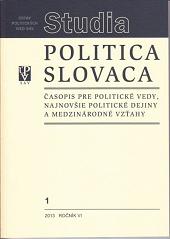Idea štátu v politických názoroch G. W. F. Hegela
The idea of the state in the political thought of G. W. F. Hegel
Author(s): Soňa Dobiášová, Daniel DobiášSubject(s): Politics / Political Sciences
Published by: Ústav politických vied Slovenskej akadémie vied
Keywords: freedom; morality; family; civil society; modern state
Summary/Abstract: G. W. F. Hegel is one of the greatest systematic and political thinker in the history of western civilisation. The main purpose of the article is account the problem of political state and morality in Hegel´s encyclopedic system, which is divided into the science of Logic, the philosophy of Nature, and the philosophy of Spirit. Exactly in the philosophy of Spirit he wrote about history, society and the state,which fall within the realm of Objective Spirit and dominated by fundamental categories such as freedom, general will, property or morality. There are important connections between the metaphysical or speculative articulation of these ideas and their application to social and political reality. This concept describe the family, civil society and the state in Hegel´s political thoughts. The family is characterized by love and means first part Hegel´s theory of morality. With civil society we move from the family to the second part of morality, where dominate categories such as freedom, property and the social system of needs.The dimension of civil society still involves administration of justice, the police and the corporations. The political state, as the third moment of morality, provides a synthesis between principles governing the family and those governing civil society. Hegel saw the state especially as objective idea.
Journal: Studia Politica Slovaca
- Issue Year: VI/2013
- Issue No: 1
- Page Range: 5-13
- Page Count: 9
- Language: Slovak

